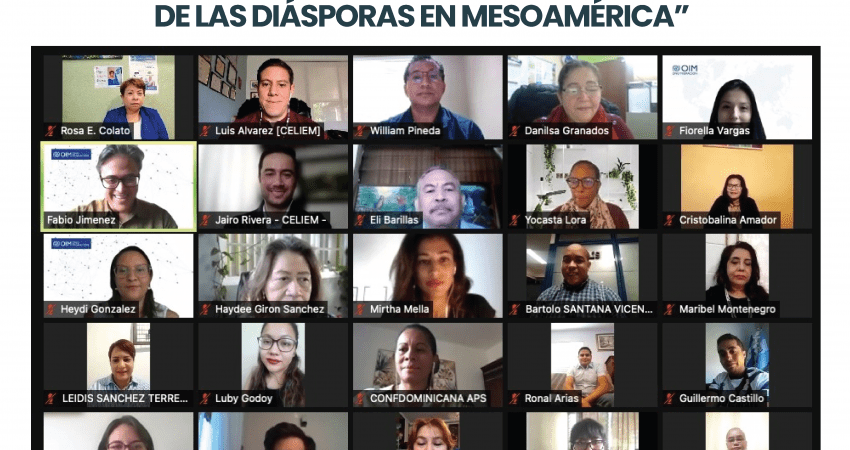IOM and CELIEM strengthen management skills of social enterprises

The International Organization for Migration (IOM) and the Latin American Center for Innovation and Entrepreneurship (CELIEM) concluded on September 30 the first Capacity Building Program for Diaspora Organizations in Mesoamerica. This specialized assistance strengthened the competencies and managerial capacities of diaspora organizations as social enterprises, in order to achieve the sustainability of their processes and the social impact of their actions. The first class includes 51 people from 14 countries.
"At IOM we contribute to strengthen the capacities of diaspora organizations in Central America in areas such as financial education, to generate development initiatives that link the projects with the community of destination, as well as in the country of origin," explained Heydi Gonzalez, support officer for the IOM Western Hemisphere Program, in her welcoming remarks.
This assistance was divided into two main components, the first aimed at developing a toolkit on good practices in financial education for diaspora organizations in Mesoamerica. It addressed five major topics: the importance of financial education, the difference between personal finances and organizational finances, the importance of savings decisions, the different financial options available, and the importance of creating financial plans and projections.
Likewise, as a second component, organizations of the Mesoamerican diaspora were accompanied in the training of entrepreneurial skills and attitudes of the people who lead the organizations. To this end, tools were developed to strengthen management, sustainability and growth in social impact. In this approach, theoretical and practical training modules were developed virtually, on different topics that will contribute to and support the diasporas in the Mesoamerica region.
"In the efforts that CELIEM and IOM have been promoting together, we believe that they will contribute to the migrant population of the Mesoamerican region to strengthen their social enterprises, promote the development of their business models and thus enhance social and economic opportunities that translate into employment generation. Strengthening these spaces for synergies enhances human capital and opens up opportunities for collaboration and networks that promote the development of enterprises," said Luis Álvarez Soto, Executive Director of CELIEM.
The validation process for both components materialized through the development of a workshop held in San José, Costa Rica. During this training, good practices in financial education were shared that will have a positive impact on diaspora organizations in Mesoamerica.
Finally, the program concluded with a virtual graduation with the participation of representatives of 32 organizations from Mexico, the Dominican Republic, Central America and South America. A symbolic presentation of certificates of achievement and participation in the program was made and IOM reiterated its commitment to continue supporting diaspora organizations as comprehensive development agents.
"We not only obtained information but also formed links with other people and learned from their experiences. My organization had never participated in a space like this before and this was possible thanks to IOM," said Luby Godoy, representative of an organization of Salvadoran youth in Belize.
This activity was implemented within the framework of IOM's Western Hemisphere Program, funded by the Bureau of Population, Refugees and Migration of the U.S. Department of State.
About CELIEM
CELIEM is an organization focused on promoting innovation, entrepreneurship and economic development in Latin America, which seeks to impact positive growth in the region through research, analysis, policy formulation, training and business support.
It aspires to be a strategic reference for businessmen, nascent entrepreneurs, organizations and public institutions linked to entrepreneurship ecosystems in Latin America, to boost competitiveness and economic, social and environmental development, for which actions are aligned with nine of the Sustainable Development Goals of the United Nations and the 2030 Agenda: end of poverty; quality education; gender equality; decent work and economic growth; industry, innovation and infrastructure; reduction of inequality; sustainable cities and communities; responsible production and consumption; and partnerships to achieve the goals.
